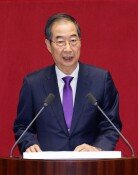The Next War: Industrial Espionage
The intelligence war between those who leak confidential information for immediate profit and the government authority trying to prevent such industrial espionage has transcended the country boundary and is spreading fiercely throughout the world.
Clues to most espionage start with words spoken inadvertently or a trivial movement from that particular company. In the case of the confidential information leakage disclosed in May, 2004 of company P, a cell phone manufacturer, tracking started out with suspecting a female employee in her twenties who had just left the company without any special reason a month before 10 million won was to be given in incentive costs.
The National Intelligence Service (NIS) pursued this female employee and grasped information that eight researchers had left the company one after another and were going to turn over the latest cellular phone manufacturing technology to a Hong Kong-based company. NIS and the prosecutors succeeded in arresting them right before the information was to be transferred. A loss of 1.5 trillion won a year was expected if this technology happened to have been leaked.
Vague information in a few words can also become a key. The NIS received a phone call late at night in May, 2003. This informer said that This is a person in the U.S., saying, I know a person who seems to be going too far. This person is trying to sell off the latest plasma display panel (PDP) technology with a person from S company to a foreign country.
After investigating the surroundings of S company, a Mr. Jeong who was excluded from a promotion to director received the spotlight. It was found that a friend of Jeong carrying on business in the U.S. said, If you turn in the PDP-related technology, you can get 200 million won for each case. All that was left was to secure evidence.
NIS obtained secret information that Jeong was going to send the confidential information through the mail, and checked through every mail drop in the some 20 post offices located around Jeongs home for a couple of days, but did not secure any conclusive evidence. As the last measure, Jeongs personal computer was seized and searched, and Jeong was arrested after key information confidential to the company was found.
The number of overseas technology leakage cases that NIS disclosed since 2003 to June 2006 was 72. Among them, 54 cases or 75 percent were semiconductor and cell phone-related technologies.
Recently, espionage has spread to technology on compartment material of middle and small-sized companies.
will71@donga.com







